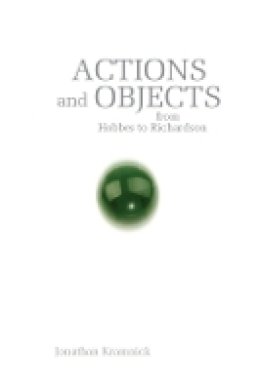Jonathan Kramnick is Associate Professor of English at Rutgers University and author of Making the English Canon: Print Capitalism and the Cultural Past 1700–1770 (1999).
"One of the virtues of this book is that it strives to keep this array of questions open as a field of problematization, rather than charting the increased consolidatioin of categories across the period in the way many genealogies have done. . . It is in moments like these—where Kramnick strives to show why hard questions of action and personhood are posed in literary rather than in philosophical forms—that his book seems most justified as a contribution to literary history."—Daniel Jump, Restoration "Excellent close readings. . . unassuming and understated prose. . . fresh approach. . . Its full contents will be picked over for some time."—Heather Zias, Scriblerian "Kramnick synthesizes key Enlightenment philosophical debates with an admirable clarity and lively style that make Actions and Objects both enjoyable to read and eminently teachable . . . [E]xcellent."—Sara Landreth, Eighteenth-Century Fiction "[F]ine and informative . . . [Kramnick] succeeds in his major ambition to qualify, in important and interesting ways, the widely held view that during the long eighteenth century, selfhood and consciousness were conceived as immaterial things that existed within an interior space and that were untouched by the material, force and necessity of the world."—William Walker, Eighteenth-Century Life "[L]ucid . . . Actions and Objects is compelling and gracefully written . . . [This is not] a mere study of how writers reflect their contemporaries' theories of mind. Rather, Actions and Objects considers how literature and literary studies alike can put hard problems into practice, test them out, add to their complexities, and refashion them in new and intriguing ways."—Crystal B. Lake, Eighteenth-Century Studies "[Kramnick's] book features incisive, surprising interpretations of texts that span the Restoration to the mid-eighteenth century—as he puts it, between 'Hobbes and Hume' and 'Rochester and Richardson'. The close readings are the signature of the book (and particularly impressive are Kramnick's sensitive considerations of mind and action, internal and external, first-person and third-person narration in Clarissa), but its principal supposition is what makes it groundbreaking for the field."—Devoney Looser, Studies in English Literature 1500-1900 "The legacy of Descartes's mind-body problem looms in this careful examination of Restoration and 18th-century theories of the mind's relationship to physical actions . . . Kramnick calls attention to 'the largely unacknowledged role of external factors in the period's conception of mind.' He finds textual evidence that philosophers and writers of the period believed human physical actions were causally connected to the mind in a way analogous to cause-effect phenomena in the material universe . . . Recommended."—C. J. Bell, CHOICE "Actions and Objects offers a startlingly original conceptualization of the eighteenth-century canon. Working with grace, imagination and rigor, Kramnick exemplifies the best of old- and new-fashioned scholarship in showing us an era preoccupied with and embattled about the person as an object, a material thing made of moving parts, whose actions are subject to external forces and perhaps disconnected from inner awareness and intention. This book, long awaited, will reward any intelligent reader who is willing to think."—Helen Deutsch, University of California, Los Angeles "Actions and Objects will set the standard in its fields for a generation. It is a serious and learned book whose subtle arguments and core wisdom will work their way into the collective consciousness of eighteenth-century literary studies, of the history of the philosophy of action, and of philosophical literary studies more generally."—Blakey Vermeule, Stanford University "As a philosopher and cognitive scientist, I read Jonathan Kramnick's book Actions and Objects from Hobbes to Richardson with mounting excitement. He makes a compelling case that Rochester's late-seventeenth-century erotic poetry—on such topics as unwelcome episodes of impotence or random sexual encounters in London's public parks—can and should be read as making innovative contributions to then flourishing debates about the nature of mind, the person and agency. What's more, Kramnick shows that these earlier debates continue to shape our engagement today with these same topics. If Kramnick is right, then contemporary philosophy of mind needs to take a new look at these old literatures. But there is a more far-reaching upshot: Kramnick describes a world where there were no sharp lines to be drawn between the work of theory and the work of the literary artist. Perhaps this too ought to serve as a model for us today? Maybe it is time for us to bridge the gap that separates the concerns and methods of science and those of literature in contemporary society. Kramnick's book is more than intellectual history. It actively engages with these important issues."—Alva Noe, University of California, Berkeley" Actions and Objects from Hobbes to Richardson is a compelling account of 'the literature and philosophy of action,' taking up texts that explore actions relative to 'the problems around consciousness and mental causation.' Jonathan Kramnick is learned without show; he has the gift of making complex philosophical and theoretical issues both interesting and readily sortable. His lively tour involves texts from Hobbes, Rochester, and Locke to Pope, Haywood, Trotter, and Richardson. This is intellectual history and literary criticism at its best."—J. Paul Hunter, University of Virginia "Jonathan Kramnick's Actions and Objects from Hobbes to Richardson is a nuanced and wide-reaching account of consciousness, materialism, and agency in eighteenth-century literature and philosophy. . . While Kramnick focuses on certain mainstays of literary criticism—character, personhood, consciousness—he nevertheless offers novel accounts of these subjects. . . Kramnick makes a compelling case for reading Restoration and eighteenth-century texts alongside contemporary philosophy and the science of mind."—Keiser, Configurations

